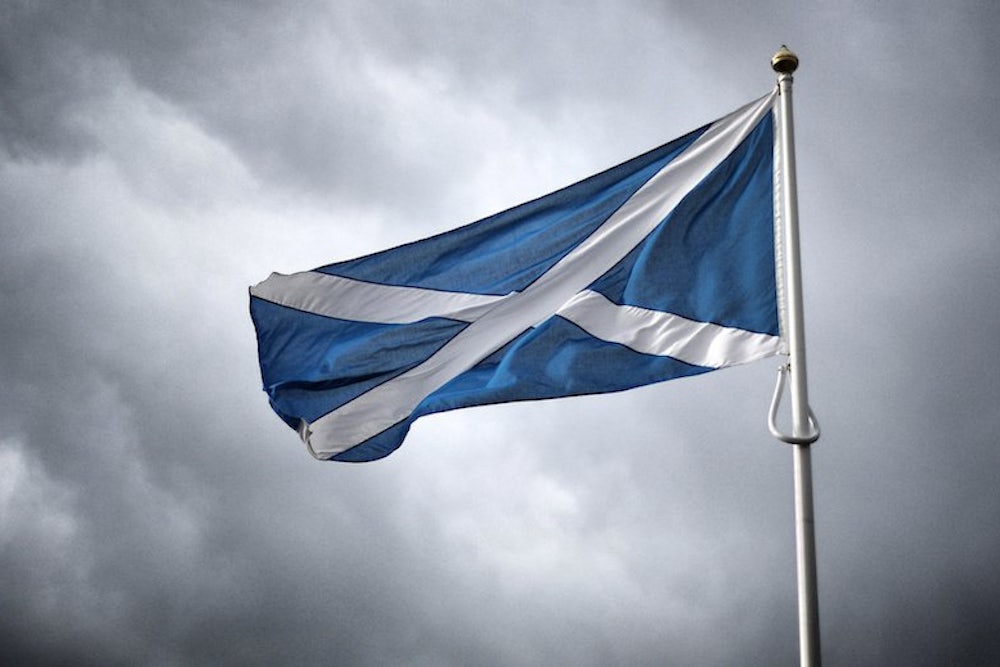November 5th is Guy Fawkes Night in the United Kingdom. It's marked by bonfires up and down the expanse of the Commonwealth, commemorating the occasion in 1605 when Guy Fawkes, a disgruntled Roman Catholic chafing under Protestant rule, tried to blow up the House of Lords with 36 barrels of gunpowder. He failed, caught before he could light the fuse.
We'll never know what would have happened if he had set the barrels aflame, and in this way the legacy of the Gunpowder Plot is one of ambivalence. Sometimes a challenge to a nation's coherence is serious. Sometimes it isn't. And often there's a fine line between the two.
Take the vote for Scottish independence last year. This was serious. Polling data put the result at a toss-up. Turnout was at extraordinary levels. Streets were packed. And the "No" camp won, keeping Scotland in the U.K.
But the specter of Scottish independence continues to haunt British politics, turning a once serious challenge into something else. And in the past year that I have spent traveling around Scotland, I've come to think that independence ought to be a singular event—not a negotiating position from which the Scots leverage their dissatisfaction with London to achieve unrelated ends.
The independence referendum was billed as a once-in-a-generation event, but we have now heard a steady drumbeat of qualifications tacked on to that from members of the Scottish National Party, which now exercises virtual one-party rule in Scotland after a historic election earlier this year that saw Labour purged from its former stronghold. If Britain votes to leave the European Union, Scotland will hold a second referendum. If support for independence reaches over 60 percent, Scotland will hold a second referendum. If the government pushes forward with a law excluding non-English members of Parliament from voting on laws pertaining solely to England, Scotland will hold a referendum. If Labour doesn't vote against a renewal of the U.K.'s nuclear weapons program, there will be a second referendum.
There were plenty of "Yes, but..." voters in the independence referendum who fell into this position, hoping that they'd get the kind of government they wanted while keeping Scotland in the union. But the latest slew of threats is politics as farce. I love Scotland, but to constantly give voice to this issue at every conceivable twist and turn risks turning its potency into a cliche. Soon we can expect crowds chanting "Arbroath!" every time the clock hits 13:20 during a football match, just as the Catalans chant for independence every time 17:14 rolls around at Barcelona's Camp Nou. And a woman as politically capable as Nicola Sturgeon, the head of the SNP, should know better.
Part of the problem is that the SNP isn't facing any particularly stiff countervailing winds just yet. Outside Scotland, they're called nationalists, but inside Scotland they're competing with the likes of the Labour-run Glasgow City Council, whose governance is perhaps best exemplified by its Guy Fawkes-esque proposal to blow up apartment buildings as part of the opening ceremony for the 2014 Commonwealth Games, only to fail to blow them up properly when the time finally came. Even the tap water is colloquially known in Glasgow as "council juice."
For its part, the SNP is far from perfect. Maintaining an efficient police force in Scotland is a problem. One MP is being investigated for housing fraud. Another MP I spoke with in the run-up to the May elections spoke in needlessly acerbic terms about the man whose parliamentary seat he would soon be filling—the former Prime Minister Gordon Brown, the embodiment of Labour's former hold on Scotland—a bruising reminiscent of Tea Party rhetoric. Education funding could be better structured. And the biggest potential economic driver for an independent Scotland—North Sea oil—just brought in negative revenue for the first time in decades, thanks to a drop in global oil prices.
As a result of these weaknesses, the cynic might argue that Sturgeon and the SNP know exactly what they're doing. Since independence is their big unifying issue, and since independence has enough support in Scotland, they can keep trotting out the referendum whenever issues come up that may threaten their hold on power.
But by pursuing a second referendum, the SNP could undermine its negotiating power with Westminster if Scotland, like Quebec before it, votes "No" for a second time. Furthermore, as Jamie Kerr of the consultant group IoD noted, "between 1978 and 1981 alone, 30 companies moved their headquarters" from Montreal to Toronto over the first independence vote—will Scotland see the same exodus if it decides to call another referendum in the next year or two? And if the SNP continues to agitate its followers with hints of another referendum, does it risk blurring the line between excitement and needless exhaustion?
Scotland deserves a better future. It might even deserve independence. But it doesn't deserve a Neverendum.
